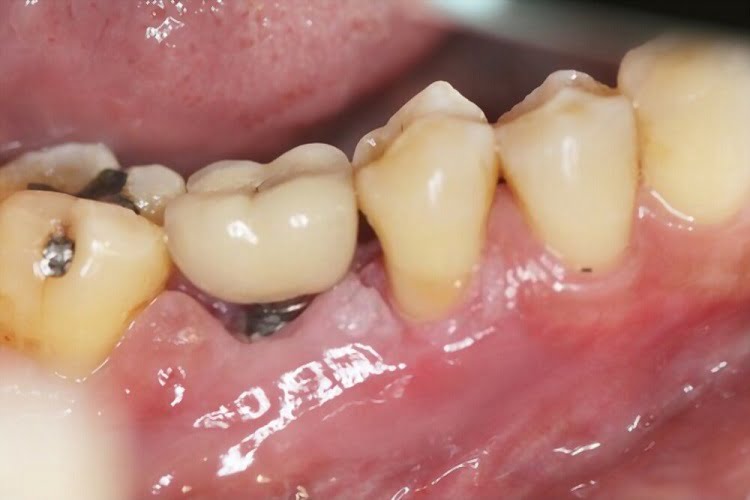Our article provides a comprehensive overview of the causes and solutions of failed implant dental. We explore the common reasons for implant failure, including poor oral hygiene, medical conditions, and lifestyle choices. Additionally, we discuss the various treatment options available to restore failed dental implants, from implant removal to bone grafting and implant replacement. With our expert insights, you can gain a deeper understanding of failed dental implants and make informed decisions about your oral health.
Why do dental implants fail?
Dental implants can fail for a variety of reasons, including poor oral hygiene, medical conditions such as diabetes, smoking, and lifestyle choices such as excessive alcohol consumption. Other factors that can contribute to implant failure include implant design, placement technique, and material used.
In some cases, implant failure may occur due to infection or bone loss around the implant. If you are experiencing symptoms of implant failure, it’s important to seek prompt treatment from your dental professional to prevent further complications.
What Are The Signs of Dental Implant Failure?
The signs of dental implant failure can include pain, swelling, infection, implant mobility, and bone loss around the implant site. If you experience any of these symptoms, it’s important to contact your dentist or oral surgeon as soon as possible to determine the cause and appropriate treatment.
See more: How long do dental implant last
Misalignment of The Implant
Misalignment of the implant can occur for a variety of reasons, including improper placement during surgery, trauma to the affected area, or gradual shifting over time.
Symptoms of misalignment may include pain, discomfort, limited range of motion, or changes in the appearance of the affected body part. Treatment options may include physical therapy, adjustments to the implant, or in some cases, revision surgery.
-
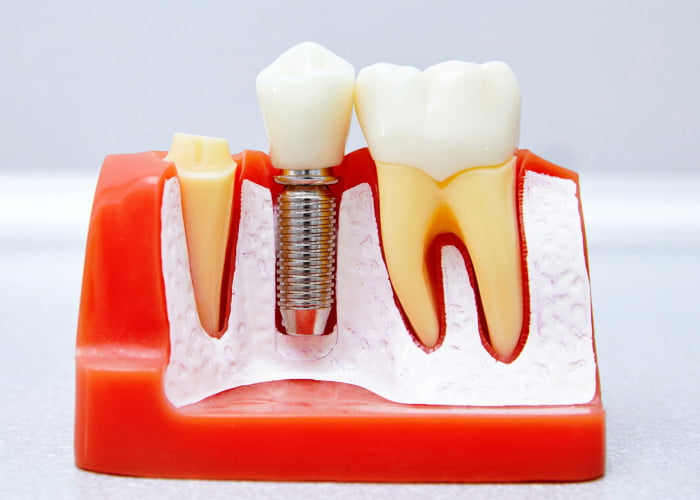
Misalignment of The Implant
Poorly Taken Impressions
Accurate impressions are vital for ensuring the proper fit and alignment of dental implants. If impressions are poorly taken or errors occur during the fabrication of the implant restoration, it can lead to implant failure.
-
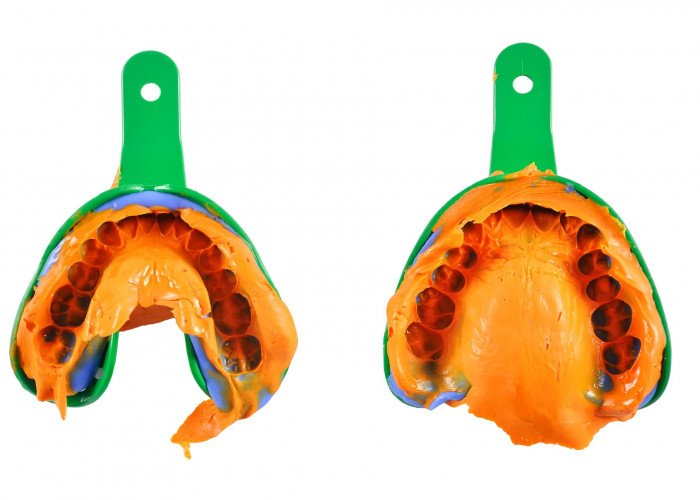
Poorly Taken Impressions
Peri-Implantitis And Other Infections
Peri-implantitis is a condition that can occur when bacteria infect the tissue surrounding a dental implant. It can cause inflammation, bleeding, and bone loss, which can ultimately lead to implant failure. Other infections that can occur around dental implants include abscesses, which are pockets of pus that can form around the implant, and gum disease, which can cause the gums to recede and expose the implant to harmful bacteria.
-

Peri-Implantitis And Other Infections
Failed Osseointegration
Failed osseointegration is a complication that can occur when artificial implants fail to integrate successfully with the surrounding bone tissue. It can be caused by factors such as poor bone quality, inadequate surgical techniques, and systemic conditions like diabetes or smoking.
Signs of failed osseointegration include pain, implant mobility, inflammation, or implant fracture. Treatment options vary depending on the cause and severity, ranging from corrective procedures to implant replacement.
Read more: How long does a root canal last without a crown ?
-
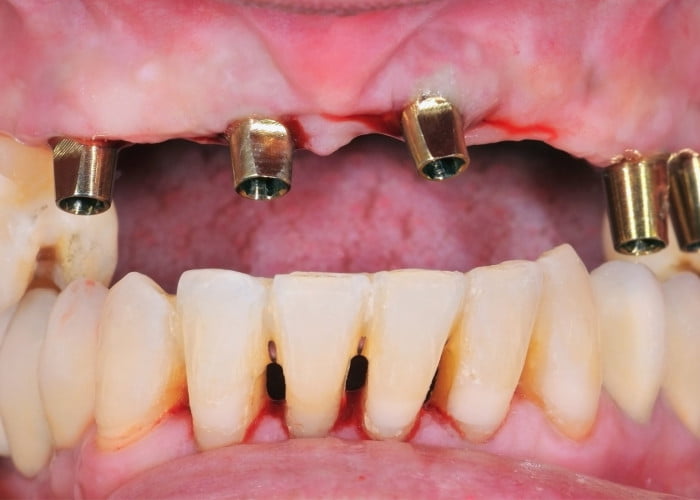
Failed Osseointegration
Nerve Damage
During the placement of dental implants, there is a slight risk of nerve damage in the surrounding area. Nerve damage can lead to numbness, tingling, or loss of sensation in the lips, gums, or chin. Severe nerve damage can contribute to implant failure.
-

Nerve Damage
Failure of The Implant Itself
Implant failure can occur due to various reasons such as material issues, design flaws, or manufacturing defects. It can result in implant fracture, loosening, or mechanical failure. Prompt intervention and proper treatment are necessary to address the issue and restore functionality. Meticulous implant selection, planning, and regular follow-up are crucial in minimizing the risk of implant failure.
-
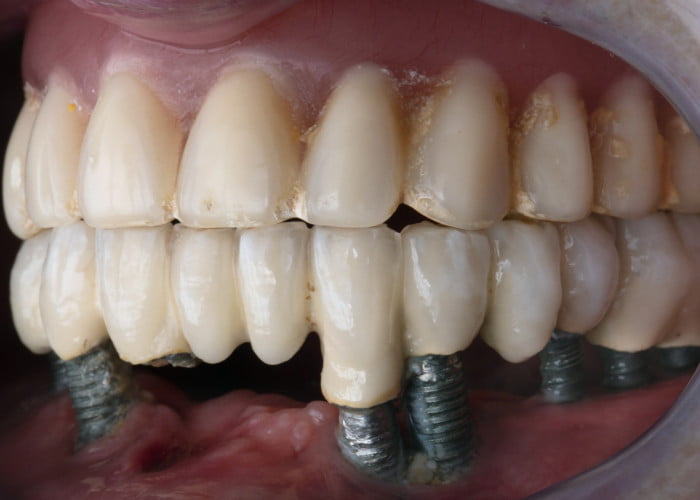
Failure of The Implant Itself
Foreign Body Rejection and Allergic Reaction
In some instances, the body may exhibit a foreign body rejection response or allergic reaction to the dental implant material. These immune system reactions can contribute to implant failure.
-

Foreign Body Rejection and Allergic Reaction
What happens if dental implants fail?
When dental implants fail, it’s essential to seek prompt professional attention. The consequences of implant failure can vary depending on the specific circumstances. Treatment options may include implant removal, bone grafting, and replacement with a new implant-supported restoration.
Can a failed dental implant be replaced?
In many cases, a failed dental implant can be replaced. The feasibility of replacing a failed implant depends on factors such as bone health, gum condition, and the specific reason for the implant failure. A thorough evaluation by a dental professional is necessary to determine the appropriate course of action.
What is the failure rate of dental implants?
The failure rate of dental implants varies depending on several factors, including the location of the implant, the patient’s oral health, and the expertise of the dental professional performing the procedure. Generally, dental implants have a high success rate, with failure rates ranging from 2% to 5% in healthy individuals.
Who is responsible for dental implant failure?
Determining responsibility for dental implant failure requires a thorough assessment of the specific circumstances. It can involve factors such as the skill and expertise of the dental professional, the patient’s oral hygiene practices, and any pre-existing conditions that may affect the success of the implant. Consulting with a dental professional and seeking legal advice, if necessary, can help in determining liability.
Book an appointment today!
If you are concerned about dental implant failure or need dental implant advice, we encourage you to make an appointment with Dentist For Life – Dentist in Marysville. Our skilled professionals will assess your individual situation, offer personalized recommendations and address any questions or concerns you may have. Don’t wait—take the first step towards a healthy and confident smile by making an appointment today!
In conclusion
While dental implant failure is relatively rare, it is crucial to be aware of the potential factors that can contribute to it. Misalignment, poorly taken impressions, peri-implantitis, failed osseointegration, nerve damage, implant failure itself, and foreign body rejection are some of the reasons that can lead to failed dental implants.

